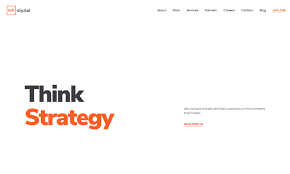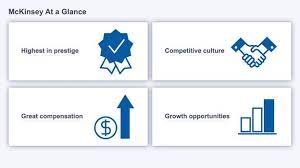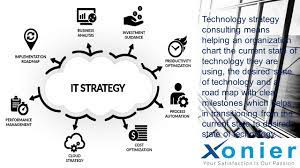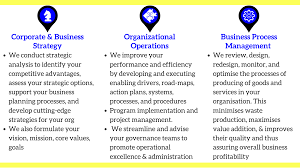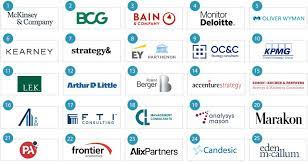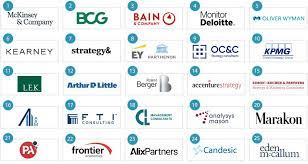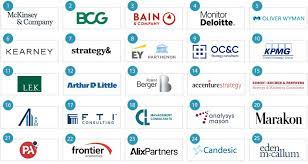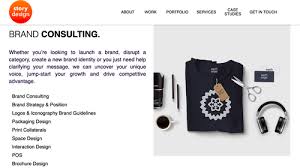Title: Navigating Success with Leading Strategy Consulting Firms
Introduction:
In today’s competitive business landscape, organizations face numerous challenges that demand strategic thinking and innovative solutions. This is where leading strategy consulting firms play a pivotal role. These firms bring a wealth of expertise, experience, and analytical thinking to help businesses navigate complex problems and achieve their goals. In this article, we will explore the key characteristics and benefits of partnering with these industry-leading firms.
Unparalleled Expertise:
Leading strategy consulting firms are known for their exceptional talent pool comprising top-tier consultants from diverse backgrounds. These professionals possess deep industry knowledge, cutting-edge analytical skills, and a track record of success. Their expertise enables them to understand complex business dynamics, identify growth opportunities, and devise effective strategies tailored to each client’s unique needs.
Objective Perspective:
One of the greatest advantages of working with strategy consulting firms is their ability to provide an unbiased and objective perspective. As external advisors, they bring fresh eyes to organizational challenges, unencumbered by internal biases or preconceived notions. This impartiality allows them to identify blind spots, challenge conventional thinking, and offer innovative solutions that may have been overlooked internally.
Data-Driven Insights:
Leading strategy consulting firms leverage data analytics tools and methodologies to gather valuable insights about market trends, customer behavior, and competitive landscapes. They employ rigorous analysis techniques to make informed decisions based on quantitative evidence rather than assumptions or gut feelings. By incorporating data-driven insights into their strategies, these firms help clients make more accurate predictions and optimize their decision-making processes.
Holistic Approach:
Strategy consulting firms adopt a holistic approach when addressing clients’ challenges. They consider various factors such as market dynamics, competitive positioning, operational capabilities, financial performance, technology trends, and regulatory landscapes. By taking a comprehensive view of the business ecosystem in which their clients operate, these firms can develop strategies that align with long-term objectives while addressing immediate needs.
Change Management Expertise:
Implementing strategic initiatives often involves significant organizational change. Leading strategy consulting firms understand the complexities associated with change management and possess the expertise to guide businesses through these transitions. They provide support in developing communication plans, managing stakeholder expectations, and ensuring smooth implementation of strategies, minimizing disruption and maximizing adoption.
Global Reach:
In an increasingly interconnected world, leading strategy consulting firms offer global reach and access to international markets. They have a presence in multiple regions and possess a deep understanding of local business practices, cultural nuances, and regulatory frameworks. This global perspective allows them to help clients expand into new markets, navigate cross-border challenges, and capitalize on emerging opportunities worldwide.
Conclusion:
Partnering with leading strategy consulting firms can be a game-changer for businesses seeking sustainable growth and competitive advantage. These firms bring a wealth of expertise, objective insights, data-driven approaches, holistic thinking, change management skills, and global reach to the table. By collaborating with these industry leaders, organizations can gain a strategic edge that propels them towards success in today’s dynamic business environment.
Advantages of Leading Strategy Consulting Firms in the UK
- Access to a global network of experts and resources
- Opportunity to work on high-profile projects
- Exposure to cutting-edge technology and industry trends
- Development of problem-solving skills
- Strong emphasis on personal development and mentoring
- Comprehensive training programmes available
- Varied career paths with potential for rapid advancement
- Competitive salaries and benefits packages
- Excellent opportunities for networking, travel and international experience
Challenges of Leading Strategy Consulting Firms in the UK
- Long working hours
- High pressure environment
- Low job security
- Limited career progression opportunities
- High cost structure
Access to a global network of experts and resources
Access to a Global Network of Experts and Resources: Empowering Business Success
In an interconnected world, businesses face the challenge of expanding into new markets, navigating complex international landscapes, and capitalizing on emerging opportunities. This is where leading strategy consulting firms truly shine, offering their clients access to a global network of experts and resources.
One of the key advantages of partnering with these firms is the ability to tap into their extensive network of professionals spread across different regions and industries. These experts bring a wealth of knowledge and experience, enabling businesses to gain valuable insights into local markets, cultural nuances, and regulatory frameworks. This global perspective is crucial for organizations seeking to expand their operations internationally.
With access to this vast network, businesses can benefit from specialized expertise in various domains. Whether it’s market research, financial analysis, technology implementation, or supply chain optimization, strategy consulting firms have the resources to assemble teams with the right skills for each unique project. This ensures that clients receive tailored solutions that address their specific challenges effectively.
Furthermore, this global network provides an invaluable source of industry connections and partnerships. Leading strategy consulting firms have established relationships with key stakeholders in different sectors worldwide. These connections can open doors for collaboration, joint ventures, and strategic alliances that can drive business growth and create new opportunities.
The access to a global network also means that businesses can leverage best practices from around the world. Strategy consulting firms continuously monitor trends and innovations across industries and geographies. By tapping into this knowledge base, organizations can stay ahead of the curve and adopt cutting-edge strategies that give them a competitive edge in their respective markets.
Additionally, this global reach allows strategy consulting firms to provide support for cross-border operations. They can assist businesses in navigating complex legal frameworks, regulatory compliance requirements, cultural sensitivities, and market dynamics in different countries. This expertise ensures smoother expansion into new territories while minimizing risks associated with unfamiliar environments.
In conclusion, access to a global network of experts and resources provided by leading strategy consulting firms is a significant advantage for businesses. It empowers organizations to gain insights into international markets, access specialized expertise, forge valuable industry connections, adopt best practices, and navigate cross-border complexities. By leveraging this global network, businesses can make informed decisions, seize opportunities, and achieve sustainable success in an increasingly interconnected world.
Opportunity to work on high-profile projects
Title: Unlocking High-profile Projects with Leading Strategy Consulting Firms
Introduction:
One of the significant advantages of partnering with leading strategy consulting firms is the opportunity to work on high-profile projects. These firms are often engaged by prestigious clients and renowned organizations to tackle complex business challenges and drive transformative change. In this article, we will explore how collaborating with these firms opens doors to exciting and impactful projects that can elevate both your professional experience and your business’s reputation.
Access to Prestigious Clients:
Leading strategy consulting firms have established a strong reputation in the industry, attracting high-profile clients from various sectors. By engaging with these firms, you gain access to a network of influential companies and organizations that are shaping their respective industries. This exposure not only enhances your professional profile but also provides invaluable networking opportunities that can lead to future collaborations or career advancements.
Complex Problem Solving:
High-profile projects often involve intricate challenges that require innovative thinking and strategic problem-solving skills. When working alongside leading strategy consulting firms, you get the chance to tackle these complex problems head-on. These firms bring together teams of experienced consultants who excel in analysing multifaceted issues, identifying root causes, and developing tailored strategies for success. Being part of such projects allows you to sharpen your problem-solving abilities and expand your knowledge across diverse industries.
Learning from Industry Experts:
Collaborating with leading strategy consulting firms offers a unique opportunity for professional growth through exposure to industry experts. These firms attract top talent from various backgrounds, including management, finance, technology, marketing, and more. By working closely with these seasoned professionals, you gain valuable insights into best practices, industry trends, and cutting-edge methodologies. Their mentorship can accelerate your learning curve and equip you with skills that are highly sought after in the competitive business landscape.
Building a Strong Portfolio:
Involvement in high-profile projects adds significant weight to your professional portfolio. The successful completion of complex initiatives for prestigious clients demonstrates your ability to deliver impactful results and handle challenging assignments. This experience becomes a valuable asset, showcasing your expertise and credibility when pursuing future opportunities, whether within your organization or when seeking new career prospects.
Enhancing Business Reputation:
For businesses themselves, collaborating with leading strategy consulting firms on high-profile projects can significantly enhance their reputation. Working with these firms signals to stakeholders, investors, and potential clients that the organization is committed to excellence and is willing to invest in strategic initiatives. The association with reputable consulting firms adds credibility and trust, positioning the business as a leader within its industry.
Conclusion:
The opportunity to work on high-profile projects is a compelling reason to partner with leading strategy consulting firms. These projects provide exposure to prestigious clients, offer complex problem-solving opportunities, facilitate learning from industry experts, build a strong professional portfolio, and enhance the overall reputation of both individuals and businesses involved. By embracing these collaborations, you open doors to exciting ventures that can propel your career or business towards new heights of success.
Exposure to cutting-edge technology and industry trends
Title: Embracing Innovation: The Pro of Exposure to Cutting-Edge Technology and Industry Trends with Leading Strategy Consulting Firms
Introduction:
In an era defined by rapid technological advancements and ever-evolving industries, staying ahead of the curve is crucial for businesses striving to maintain their competitive edge. Leading strategy consulting firms offer a significant advantage in this regard by providing exposure to cutting-edge technology and industry trends. In this article, we will explore how partnering with these firms can help businesses embrace innovation and leverage the latest advancements to drive growth.
Access to Emerging Technologies:
Leading strategy consulting firms have their finger on the pulse of emerging technologies that are reshaping industries. They possess a deep understanding of how these technologies, such as artificial intelligence, blockchain, Internet of Things (IoT), and data analytics, can revolutionize business operations. By collaborating with these firms, businesses gain insights into the potential applications of these technologies within their specific industry, enabling them to make informed decisions about adopting and integrating them into their strategies.
Industry-Specific Knowledge:
Strategy consulting firms specialize in various industries and invest heavily in research and analysis to stay up-to-date with the latest trends. This industry-specific knowledge allows them to provide valuable insights into market dynamics, customer preferences, regulatory changes, and emerging opportunities. By leveraging this expertise, businesses can align their strategies with industry trends and capitalize on new developments before their competitors do.
Innovative Thinking:
Leading strategy consulting firms foster a culture of innovation and creative problem-solving. They encourage out-of-the-box thinking and challenge conventional approaches. By engaging with consultants who are at the forefront of industry trends and technology advancements, businesses gain fresh perspectives that can spark innovative ideas within their own organizations. This exposure inspires companies to think differently about their products, services, processes, and business models.
Competitive Advantage:
Embracing cutting-edge technology and industry trends can provide a significant competitive advantage. By leveraging the expertise of strategy consulting firms, businesses can identify opportunities to differentiate themselves from competitors and create unique value propositions. They can also gain insights into how technology can streamline operations, enhance customer experiences, and optimize decision-making processes. This proactive approach allows businesses to stay ahead of the curve and position themselves as industry leaders.
Future-Proofing Strategies:
By partnering with leading strategy consulting firms, businesses can future-proof their strategies. These firms help companies anticipate and prepare for potential disruptions caused by technological advancements or industry shifts. By understanding the impact of emerging trends on their business models, organizations can adapt early, ensuring they remain relevant and resilient in an ever-changing landscape.
Conclusion:
Exposure to cutting-edge technology and industry trends is a significant pro of partnering with leading strategy consulting firms. The ability to embrace innovation, leverage emerging technologies, gain industry-specific knowledge, foster innovative thinking, gain a competitive advantage, and future-proof strategies are invaluable benefits that these firms offer. By capitalizing on these advantages, businesses can position themselves as pioneers in their industries and drive sustainable growth in an increasingly dynamic business environment.
Development of problem-solving skills
Title: Leading Strategy Consulting Firms: Cultivating Problem-Solving Skills
Introduction:
In the ever-evolving business landscape, problem-solving skills have become a crucial asset for organizations seeking to thrive amidst challenges and uncertainties. Leading strategy consulting firms excel in developing these skills in their clients, enabling them to tackle complex issues with confidence and agility. In this article, we explore how these firms contribute to the development of problem-solving skills and why it is a significant advantage for businesses.
An Analytical Approach:
Strategy consulting firms are renowned for their analytical prowess. They possess a systematic and structured approach to problem-solving that involves breaking down complex issues into manageable components. By working closely with clients, these firms teach them how to approach problems critically, identify root causes, gather relevant data, and analyze information effectively. This analytical framework equips clients with the necessary tools to address challenges in a logical and methodical manner.
Strategic Thinking:
Leading strategy consulting firms foster strategic thinking within their clients’ organizations. They encourage executives and teams to adopt a broader perspective when assessing problems and making decisions. Through collaborative workshops, brainstorming sessions, and strategic planning exercises, these firms help clients develop the ability to think long-term, anticipate future trends, evaluate various alternatives, and make informed choices that align with their overall business objectives.
Creative Problem-Solving:
In addition to analytical thinking, strategy consulting firms promote creativity in problem-solving. They encourage clients to explore innovative solutions beyond traditional approaches. By challenging conventional wisdom and encouraging “outside-the-box” thinking, these firms stimulate creativity within client teams. This fosters an environment where employees feel empowered to generate fresh ideas and embrace unconventional strategies that can lead to breakthrough solutions.
Collaborative Learning:
Leading strategy consulting firms emphasize collaborative learning as a means of developing problem-solving skills. Through workshops, training programs, and knowledge-sharing sessions, they facilitate the exchange of ideas and best practices among team members. By creating an environment that encourages open dialogue and cross-functional collaboration, these firms enable clients to tap into the collective intelligence of their workforce, fostering a culture of continuous learning and improvement.
Transferable Skills:
The problem-solving skills developed through engagements with strategy consulting firms are highly transferable. Clients acquire a set of skills that can be applied to various business challenges beyond the scope of their initial engagement. This empowers organizations to address future issues independently, reducing reliance on external consultants and building internal capabilities for long-term success.
Conclusion:
The development of problem-solving skills is a significant pro offered by leading strategy consulting firms. Their analytical approach, strategic thinking guidance, encouragement of creative problem-solving, emphasis on collaborative learning, and focus on developing transferable skills all contribute to enhancing an organization’s problem-solving capabilities. By partnering with these firms, businesses can cultivate a problem-solving mindset that enables them to navigate complexities confidently and find innovative solutions in an ever-changing business landscape.
Strong emphasis on personal development and mentoring
Title: Personal Development and Mentoring: A Key Advantage of Leading Strategy Consulting Firms
Introduction:
In addition to their strategic acumen and problem-solving capabilities, leading strategy consulting firms offer a unique advantage that sets them apart from the rest – a strong emphasis on personal development and mentoring. This commitment to nurturing talent not only benefits their consultants but also translates into better outcomes for their clients. In this article, we will explore how this focus on personal growth and mentorship contributes to the success of both individuals and the firms they represent.
Cultivating Future Leaders:
Leading strategy consulting firms understand that investing in the development of their people is crucial for long-term success. These firms actively cultivate future leaders by providing comprehensive training programs, mentorship opportunities, and continuous learning initiatives. Consultants are exposed to a variety of industries, business challenges, and client engagements, allowing them to develop a broad skill set and gain invaluable experience.
Individual Growth Opportunities:
Personal development is at the core of leading strategy consulting firms’ ethos. These firms provide consultants with access to a wealth of resources, including workshops, seminars, online courses, and industry conferences. This commitment to continuous learning allows consultants to stay ahead of industry trends, expand their knowledge base, and enhance their skills in areas such as leadership, communication, problem-solving, and project management.
Mentorship for Success:
Mentorship plays a vital role in the professional journey of consultants at leading strategy consulting firms. Seasoned professionals within these firms act as mentors, guiding and supporting junior consultants through various stages of their careers. Mentorship programs provide opportunities for knowledge transfer, career advice, networking connections, and personal growth guidance. This mentor-mentee relationship fosters an environment where individuals can thrive both professionally and personally.
Well-rounded Skill Development:
Leading strategy consulting firms recognize that success in consulting requires more than just technical expertise. They place a strong emphasis on developing well-rounded consultants who possess a diverse set of skills. In addition to honing their analytical and problem-solving abilities, consultants are encouraged to develop skills such as critical thinking, creativity, adaptability, and effective communication. This comprehensive skill development equips consultants to tackle complex challenges with confidence and deliver exceptional results.
Client Benefits:
The focus on personal development and mentoring within leading strategy consulting firms directly benefits their clients. Consultants who have undergone rigorous training programs and received mentorship are better equipped to understand client needs, provide valuable insights, and deliver high-quality solutions. Their enhanced skill set allows them to navigate complex business environments effectively, ensuring that clients receive the best possible guidance and support.
Conclusion:
The strong emphasis on personal development and mentoring within leading strategy consulting firms creates a win-win situation for both consultants and clients. By investing in the growth of their people, these firms cultivate future leaders, provide opportunities for individual growth, foster mentorship relationships, and develop well-rounded consultants. This commitment to personal development translates into better outcomes for clients as they benefit from the expertise of highly skilled consultants who are continuously evolving and expanding their capabilities.
Comprehensive training programmes available
Title: Comprehensive Training Programmes: Empowering Businesses with Leading Strategy Consulting Firms
Introduction:
When it comes to partnering with leading strategy consulting firms, businesses gain access to a multitude of benefits. One such advantage is the availability of comprehensive training programmes offered by these firms. In this article, we will explore how these training initiatives empower businesses and contribute to their long-term success.
Knowledge Transfer:
Leading strategy consulting firms recognize the importance of knowledge transfer in driving sustainable growth. Through their comprehensive training programmes, they aim to equip businesses with the tools, frameworks, and methodologies necessary for strategic decision-making. These programmes cover a wide range of topics, including market analysis, competitive intelligence, financial modelling, leadership development, and change management. By imparting this knowledge, consulting firms empower businesses to make informed decisions independently.
Enhanced Skillsets:
Training programmes provided by leading strategy consulting firms go beyond theoretical knowledge. They focus on developing practical skills that can be applied in real-world scenarios. Participants learn how to conduct rigorous data analysis, think critically and strategically, communicate effectively, and collaborate with cross-functional teams. These enhanced skillsets enable employees to tackle complex business challenges confidently and contribute more effectively towards achieving organizational goals.
Continuous Learning Culture:
Strategy consulting firms foster a culture of continuous learning through their training programmes. They understand that business landscapes are constantly evolving and that staying ahead requires ongoing development. By offering regular training opportunities, these firms encourage employees to stay updated with industry trends and emerging best practices. This commitment to continuous learning helps businesses adapt quickly to changing market dynamics and seize new opportunities.
Customized Solutions:
Comprehensive training programmes from leading strategy consulting firms are designed to address specific needs identified within an organization. These programmes can be tailored based on the industry sector, company size, organizational structure, or individual roles within the business. By customizing the training content and delivery, consulting firms ensure that participants receive relevant and practical knowledge that directly aligns with their business objectives.
Employee Engagement and Retention:
Investing in employee development through training programmes demonstrates a company’s commitment to its workforce. This commitment fosters a sense of loyalty, engagement, and motivation among employees. When businesses partner with leading strategy consulting firms for training initiatives, they provide employees with valuable learning opportunities that contribute to their professional growth. This investment in talent development can significantly improve employee retention rates and attract top talent to the organization.
Conclusion:
Comprehensive training programmes offered by leading strategy consulting firms play a vital role in empowering businesses. By facilitating knowledge transfer, enhancing skillsets, fostering a continuous learning culture, providing customized solutions, and promoting employee engagement and retention, these programmes contribute to the long-term success of organizations. Businesses that embrace these training initiatives gain a competitive edge by equipping their workforce with the necessary tools and expertise to navigate complex challenges confidently.
Varied career paths with potential for rapid advancement
Title: Varied Career Paths and Rapid Advancement: Unlocking Opportunities with Leading Strategy Consulting Firms
Introduction:
For professionals seeking dynamic and rewarding careers, leading strategy consulting firms offer an array of opportunities. These firms not only provide a platform for personal and professional growth but also offer the potential for rapid advancement. In this article, we will explore how working with these industry leaders can open doors to varied career paths and accelerate one’s professional development.
Exposure to Diverse Industries:
Leading strategy consulting firms work with clients across a wide range of industries, including technology, healthcare, finance, consumer goods, and more. This exposure allows consultants to gain comprehensive knowledge about various sectors and develop a broad skill set. By working on diverse projects, professionals can expand their expertise and become versatile strategists capable of tackling complex challenges in different industries.
Continuous Learning Opportunities:
Strategy consulting is a field that demands continuous learning and growth. Leading firms invest heavily in training programs, workshops, and mentorship initiatives to nurture their talent pool. Consultants are exposed to cutting-edge methodologies, frameworks, and best practices that enhance their problem-solving abilities. This commitment to ongoing learning ensures that professionals stay at the forefront of industry trends while continuously expanding their knowledge base.
Challenging Projects:
Leading strategy consulting firms are renowned for taking on high-impact projects that shape the future of businesses. Working on such challenging assignments provides consultants with opportunities to solve complex problems, make strategic recommendations, and drive meaningful change within organizations. These projects not only sharpen analytical skills but also foster creativity, innovation, and critical thinking – essential qualities for career advancement.
Mentorship by Industry Experts:
One significant advantage of working in leading strategy consulting firms is the access to mentorship by industry experts. Seasoned professionals within these firms provide guidance, support, and valuable insights based on their wealth of experience. Mentorship programs help junior consultants navigate their career paths, develop essential skills, and gain exposure to senior-level decision-making processes. This mentorship accelerates professional growth and opens doors to higher-level roles within the firm.
Global Opportunities:
Leading strategy consulting firms operate on a global scale, with offices in major cities around the world. This global footprint presents professionals with opportunities for international assignments and cross-cultural experiences. Working in different regions exposes consultants to diverse business environments, challenges, and perspectives. These global opportunities not only broaden horizons but also enhance adaptability, cultural intelligence, and the ability to work effectively in multicultural teams.
Rapid Advancement:
Leading strategy consulting firms are known for their meritocratic cultures that reward exceptional performance and drive rapid advancement. Consultants who consistently deliver outstanding results can progress quickly through the ranks, assuming greater responsibilities and leadership roles within the firm. This rapid advancement offers professionals the chance to accelerate their careers and achieve significant milestones in a relatively short period.
Conclusion:
Working with leading strategy consulting firms offers professionals a multitude of benefits, including varied career paths and rapid advancement opportunities. Exposure to diverse industries, continuous learning programs, challenging projects, mentorship by industry experts, global opportunities, and a meritocratic culture all contribute to accelerated professional growth within these firms. For ambitious individuals seeking dynamic careers that foster personal development and open doors to exciting possibilities, partnering with leading strategy consulting firms can be an unparalleled opportunity.
Competitive salaries and benefits packages
Title: Competitive Salaries and Benefits Packages: A Perk of Leading Strategy Consulting Firms
Introduction:
When considering a career in strategy consulting, one of the many attractive aspects is the competitive salaries and benefits packages offered by leading firms. In this article, we will explore how these firms prioritize rewarding their employees with attractive compensation packages, showcasing why this is a significant advantage for those working in the industry.
Recognition of Talent:
Leading strategy consulting firms understand the value of attracting and retaining top talent. To ensure they can attract the best professionals in the field, these firms offer highly competitive salaries. By offering above-average compensation, these companies recognize and reward the expertise, skills, and dedication that consultants bring to their work.
Financial Stability:
The financial stability of leading strategy consulting firms allows them to offer generous salaries and benefits packages. These companies often have a robust client base and a steady stream of projects, which provides a strong foundation for sustaining competitive compensation structures. This stability not only enhances job security but also provides consultants with peace of mind as they focus on delivering exceptional results for clients.
Comprehensive Benefits Packages:
In addition to competitive salaries, leading strategy consulting firms also provide comprehensive benefits packages. These packages typically include health insurance coverage, retirement plans, paid time off allowances, professional development opportunities, performance bonuses, and other perks tailored to meet the needs of their employees. Such benefits demonstrate a commitment to employee well-being and professional growth.
Performance-Based Incentives:
Leading strategy consulting firms often employ performance-based incentive structures that reward exceptional contributions. Consultants who consistently deliver outstanding results may receive bonuses or profit-sharing arrangements based on individual or team performance metrics. This incentivizes consultants to continuously strive for excellence while fostering a culture of meritocracy within the firm.
Career Advancement Opportunities:
Another advantage offered by leading strategy consulting firms is the potential for rapid career progression. These firms typically have structured career development paths that allow consultants to advance based on their skills, experience, and contributions. As consultants progress in their careers, they can expect increased responsibilities and corresponding salary increments, providing a clear pathway for growth and professional advancement.
Conclusion:
Competitive salaries and benefits packages are a significant perk of working in leading strategy consulting firms. These firms recognize the value of their employees’ expertise and dedication by offering above-average compensation. Additionally, comprehensive benefits packages, performance-based incentives, and clear career advancement opportunities contribute to creating an attractive work environment for talented professionals seeking rewarding careers in strategy consulting. Ultimately, these competitive compensation structures reinforce the commitment of leading strategy consulting firms to attracting and retaining top talent in the industry.
Excellent opportunities for networking, travel and international experience
Title: Expanding Horizons: Networking, Travel, and International Experience with Leading Strategy Consulting Firms
Introduction:
In addition to their expertise in strategic thinking and problem-solving, leading strategy consulting firms offer professionals a unique opportunity for personal and professional growth. One of the notable benefits of working with these firms is the exposure to excellent networking opportunities, travel, and international experience. In this article, we will explore how these aspects contribute to the development of well-rounded consultants.
Networking:
Leading strategy consulting firms attract top talent from diverse backgrounds, creating a rich network of professionals within the organization. Working alongside colleagues who possess a wide range of skills and experiences provides an ideal environment for networking and collaboration. Consultants have the opportunity to build relationships with like-minded individuals who share their passion for problem-solving and innovation. These connections can lead to valuable partnerships, mentorship opportunities, and future career prospects.
Furthermore, these firms often engage with high-profile clients from various industries. This exposure allows consultants to interact with senior executives and industry leaders on a regular basis. Building relationships with influential individuals not only expands professional networks but also opens doors to new opportunities and perspectives.
Travel:
Leading strategy consulting firms frequently work on projects that require them to operate across different geographical locations. This provides consultants with exciting travel opportunities that broaden their horizons both personally and professionally. Travelling for work allows consultants to immerse themselves in different cultures, understand local business practices, and gain a global perspective.
Working in diverse environments fosters adaptability, cross-cultural communication skills, and an appreciation for diversity – all qualities highly valued in today’s interconnected world. Additionally, exposure to different markets enables consultants to develop a deeper understanding of regional dynamics and emerging trends that can be applied when advising clients on international expansion strategies.
International Experience:
Leading strategy consulting firms often have a global presence with offices in multiple countries around the world. This opens doors for consultants seeking international experience or relocation opportunities. Working abroad provides a unique chance to gain exposure to different business environments, regulatory frameworks, and market dynamics. It allows consultants to develop a global mindset, adapt to new challenges, and enhance their problem-solving abilities in diverse contexts.
International experience also offers personal growth opportunities, such as expanding cultural awareness, building resilience, and developing a broader perspective on global issues. These qualities not only contribute to professional success but also enrich one’s overall life experiences.
Conclusion:
Working with leading strategy consulting firms offers professionals more than just challenging projects and career advancement. The excellent networking opportunities, travel experiences, and international exposure create a dynamic environment that fosters personal and professional growth. By embracing these aspects, consultants can expand their horizons, build valuable connections, gain a global perspective, and develop skills that will serve them well throughout their careers.
Long working hours
Title: Striking a Balance: The Work-Life Challenge of Leading Strategy Consulting Firms
Introduction:
While leading strategy consulting firms offer invaluable expertise and insights, it is essential to acknowledge the challenges that come with working in this dynamic industry. One notable con is the demanding nature of the job, which often leads to long working hours and a potential lack of work-life balance. In this article, we will explore the impact of extended work hours on consultants and discuss strategies for achieving a healthier equilibrium.
The Reality of Long Hours:
Strategy consultants are renowned for their dedication and commitment to delivering exceptional results. However, this often translates into working long hours, including weekends and holidays. The demanding nature of client engagements, tight deadlines, and the need to meet high client expectations can lead to a significant strain on work-life balance.
Effects on Work-Life Balance:
The long working hours associated with strategy consulting can have adverse effects on personal well-being and relationships. The lack of time for leisure activities, family commitments, or pursuing personal interests can lead to increased stress levels and feelings of burnout. Maintaining healthy relationships with loved ones becomes challenging when work takes precedence consistently.
Strategies for Achieving Balance:
Despite the inherent demands of strategy consulting, there are strategies that consultants can employ to strike a better work-life balance:
- Prioritize Self-Care: It is crucial for consultants to prioritize self-care by setting aside time for exercise, relaxation, hobbies, and quality sleep. By taking care of their physical and mental well-being, they can enhance productivity while reducing stress levels.
- Effective Time Management: Consultants should adopt efficient time management techniques such as prioritizing tasks, setting realistic deadlines, delegating when appropriate, and avoiding time-wasting activities. By maximizing productivity during working hours, they can create space for personal life.
- Clear Communication Boundaries: Establishing clear communication boundaries with clients and team members can help manage expectations. Setting realistic response times and managing project timelines effectively can alleviate the pressure of being constantly on-call.
- Team Collaboration: Foster a collaborative team environment where workload distribution is fair and balanced. Encouraging teamwork and open communication enables consultants to support one another, reducing individual workloads and promoting a healthier work-life balance for the entire team.
- Utilize Technology: Leverage technology tools that streamline processes, automate repetitive tasks, and enhance efficiency. By optimizing workflow through technology, consultants can save time, allowing for greater flexibility in managing their personal lives.
Conclusion:
While long working hours are a con associated with leading strategy consulting firms, it is important to recognize that achieving a healthy work-life balance is possible with conscious effort and effective strategies. By prioritizing self-care, practicing efficient time management, setting clear boundaries, fostering teamwork, and utilizing technology wisely, consultants can navigate the demanding nature of their profession while maintaining personal well-being and nurturing meaningful relationships outside of work. Striking a balance between professional success and personal fulfillment is key to long-term satisfaction in the strategy consulting industry.
High pressure environment
Title: The High-Pressure Environment of Leading Strategy Consulting Firms
Introduction:
Leading strategy consulting firms are renowned for their ability to tackle complex business challenges and deliver innovative solutions. However, it is important to acknowledge that the high-pressure environment within these firms can be demanding and stressful for some individuals. In this article, we will explore this con of leading strategy consulting firms and its potential impact on professionals in the field.
Intense Workload:
Strategy consulting projects often come with tight deadlines and high expectations. Consultants are required to work long hours, including weekends and evenings, to meet client demands. The workload can be overwhelming, especially during critical project phases or when multiple projects overlap. This intensity can lead to burnout and affect work-life balance, potentially impacting the well-being of consultants.
Tight Decision-Making Timelines:
In strategy consulting, consultants are expected to make crucial decisions quickly and under pressure. The need for rapid analysis and decision-making can create a sense of urgency that may not suit everyone’s working style. This constant need to perform at a high level within tight timelines can increase stress levels and contribute to a high-pressure environment.
Client Expectations:
Leading strategy consulting firms are known for their commitment to delivering exceptional results for clients. However, this also means that consultants face immense pressure to meet or exceed client expectations consistently. The need to impress clients and maintain strong relationships adds an additional layer of stress, as consultants strive to provide value while managing complex projects simultaneously.
Travel Demands:
Consultants in leading strategy consulting firms often find themselves traveling extensively due to project requirements. Frequent travel can disrupt personal routines, lead to fatigue, and limit time spent with family and friends. The constant juggling between client sites and home offices can further intensify the already demanding nature of the job.
High Performance Expectations:
The competitive nature of strategy consulting firms fosters an environment where high performance is expected at all times. Consultants are continuously evaluated based on their ability to deliver exceptional results, often under challenging circumstances. This constant need to excel can create a sense of pressure and may not be suitable for individuals who thrive in less intense work environments.
Conclusion:
While leading strategy consulting firms offer numerous benefits and opportunities for professional growth, it is important to recognize that the high-pressure environment can be stressful and demanding for some individuals. The intense workload, tight decision-making timelines, client expectations, travel demands, and high performance expectations contribute to this pressure. It is crucial for professionals considering a career in strategy consulting to carefully evaluate their own preferences and abilities to thrive in such an environment and ensure they prioritize self-care amidst the demanding nature of the industry.
Low job security
Title: Job Security Concerns in Leading Strategy Consulting Firms
Introduction:
While leading strategy consulting firms offer numerous benefits to both clients and consultants, it is important to acknowledge some of the challenges that professionals in this field may face. One notable con is the issue of low job security. In this article, we will explore the implications of being hired on a project-by-project basis and how it affects employment stability within these firms.
Project-Based Employment:
In the world of strategy consulting, consultants are typically hired for specific projects or engagements. This means that their employment is contingent upon securing new projects once their current assignment is completed. Unlike traditional full-time positions, job security in this industry is not guaranteed from one project to the next.
Uncertainty and Instability:
The nature of project-based employment can create a sense of uncertainty and instability for consultants. With each project’s completion, there may be a period of downtime before the next opportunity arises. During these gaps, consultants may face financial uncertainty and may need to actively seek new projects or engage in networking activities to secure their next assignment.
Competition for Projects:
Given that many consultants are vying for limited project opportunities within leading strategy consulting firms, competition can be fierce. The need to consistently prove one’s value and secure new projects can create a high-pressure environment where individuals must continuously demonstrate their expertise and deliver exceptional results.
Limited Career Progression:
The project-based nature of employment within strategy consulting firms can also impact career progression. Advancement within these firms often relies on securing higher-profile projects or taking on leadership roles within engagements. With limited job security, it can be challenging for consultants to plan long-term career trajectories or have a clear path towards promotion.
Adapting to Change:
The dynamic nature of project-based work requires consultants to be adaptable and flexible. They must quickly transition from one project to another, often in different industries or sectors, and adjust to new team dynamics and client expectations. While this can enhance professional growth and diversify skill sets, it may also pose challenges for those who prefer stability and continuity in their work environment.
Conclusion:
Low job security is a significant con associated with leading strategy consulting firms. The project-based nature of employment creates uncertainty, competition for projects, limited career progression opportunities, and a constant need to adapt to change. It is crucial for individuals considering a career in this field to weigh these factors alongside the benefits offered by strategy consulting firms. By understanding the potential challenges, consultants can make informed decisions about their career paths and take proactive steps to mitigate the impact of low job security concerns.
Limited career progression opportunities
Title: The Conundrum of Limited Career Progression in Leading Strategy Consulting Firms
Introduction:
While leading strategy consulting firms offer a multitude of benefits, it is essential to consider potential drawbacks as well. One significant con that aspiring consultants may face is limited career progression opportunities within these firms. This article will explore the challenges associated with advancing into senior positions due to the nature of projects and client relationships in the consulting industry.
The Short-Term Nature of Projects:
One of the primary reasons for limited career progression in strategy consulting firms is the short-term nature of projects. Consultants are typically engaged on specific assignments, often lasting a few months to a couple of years. Once a project concludes, consultants may need to move on to new projects or clients, making it challenging to develop long-term relationships and build substantial expertise in a particular industry or sector.
Lack of Long-Term Client Relationships:
In strategy consulting, client relationships tend to be project-based rather than long-term partnerships. While consultants work closely with clients during engagements, once the project ends, there may be limited opportunities for ongoing collaboration. This lack of continuity can hinder career progression as it limits the ability to deepen client relationships and gain valuable insights from long-term interactions.
Competitive Environment:
The consulting industry is highly competitive, with numerous talented individuals vying for limited senior positions within leading firms. As a result, climbing the corporate ladder can be challenging due to intense competition from colleagues who possess similar skill sets and qualifications. This competitive environment often necessitates exceptional performance and consistent delivery of outstanding results to stand out among peers.
Emphasis on Project Delivery over Skill Development:
In strategy consulting firms, there is often a strong emphasis on delivering successful projects within tight timelines and budget constraints. While this focus ensures client satisfaction and business growth, it may leave little room for individual skill development and career advancement. Consultants may find themselves primarily focused on executing projects rather than receiving comprehensive training or mentorship opportunities to develop broader strategic skills.
Alternative Career Paths:
Due to the limited career progression within consulting firms, some consultants may explore alternative career paths outside of these organizations. This can include moving into industry-specific roles, entrepreneurship, or pursuing advanced education to gain specialized knowledge. While this diversification can offer new avenues for growth, it may also lead to a departure from the traditional consulting career trajectory.
Conclusion:
While leading strategy consulting firms offer immense value and opportunities for professional growth, it is important to consider the potential con of limited career progression within these organizations. The short-term nature of projects, lack of long-term client relationships, competitive environment, and focus on project delivery over skill development can pose challenges for consultants aspiring to advance into more senior positions. It is crucial for individuals considering a career in strategy consulting to carefully evaluate their long-term goals and weigh the pros and cons before embarking on this path.
High cost structure
Title: Evaluating the Cost Factor: High Overhead Costs of Leading Strategy Consulting Firms
Introduction:
While leading strategy consulting firms offer a range of benefits, it is important to consider potential drawbacks as well. One notable con is the high cost structure associated with engaging these firms. In this article, we will explore the impact of their overhead costs and how it can affect clients’ decision-making processes.
Understanding Overhead Costs:
Leading strategy consulting firms often have significant overhead expenses. These costs include maintaining prestigious office spaces in prime locations, hiring and retaining top-tier consultants, investing in advanced technology and data analytics tools, conducting research and development activities, and marketing their services. These expenses contribute to the overall cost structure of these firms.
Impact on Affordability:
The high cost structure of strategy consulting firms can make their services expensive for clients, particularly small or medium-sized businesses with limited budgets. Engaging these firms on an ongoing basis may not be financially viable for all organizations. The fees charged by these firms typically reflect the value they bring and the expertise they provide; however, it is crucial for clients to carefully assess their budgetary constraints before committing to long-term partnerships.
Alternative Options:
For companies looking for more cost-effective solutions or seeking specific short-term engagements, there are alternative options available. These may include independent consultants or boutique consulting firms that offer specialized expertise at a lower price point. While they may lack the scale or brand recognition of leading strategy consulting firms, these alternatives can still provide valuable insights and customized strategies tailored to specific business needs.
Weighing Value vs Cost:
When evaluating the high cost structure of leading strategy consulting firms, it is essential to consider the value they bring to the table. Their expertise, industry knowledge, data-driven insights, and global reach can significantly impact a company’s growth trajectory and competitive advantage. It is crucial to assess the potential return on investment (ROI) and long-term benefits that can be derived from engaging these firms, weighing them against the associated costs.
Selective Engagements:
To optimize cost-effectiveness, clients can consider selective engagements with strategy consulting firms. This approach involves identifying key areas where external expertise is most needed and engaging the firm for specific projects or critical strategic initiatives. By carefully choosing the scope and duration of their involvement, organizations can maximize the value gained from these partnerships while managing costs more efficiently.
Conclusion:
The high cost structure of leading strategy consulting firms is an important factor to consider when evaluating their services. While their expertise and resources come at a premium, it is crucial for clients to assess their budgetary limitations and weigh the potential value against the associated costs. Exploring alternative options or adopting a selective engagement approach can help businesses strike a balance between affordability and accessing the strategic insights needed to drive growth and success in today’s competitive landscape.



